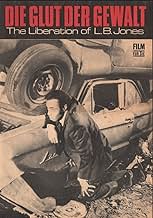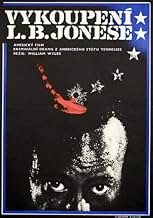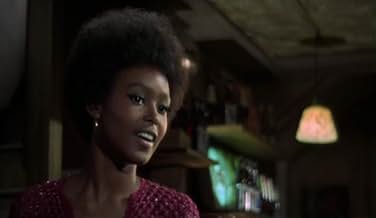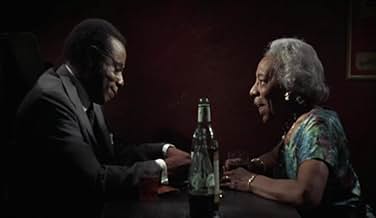IMDb रेटिंग
6.8/10
1.3 हज़ार
आपकी रेटिंग
अपनी भाषा में प्लॉट जोड़ेंA successful African American businessman has a quarrel with a white policeman, suspecting that he is having an affair with his wife. The policeman's colleagues are seeking to avoid publicit... सभी पढ़ेंA successful African American businessman has a quarrel with a white policeman, suspecting that he is having an affair with his wife. The policeman's colleagues are seeking to avoid publicity.A successful African American businessman has a quarrel with a white policeman, suspecting that he is having an affair with his wife. The policeman's colleagues are seeking to avoid publicity.
- पुरस्कार
- कुल 1 नामांकन
Joseph Attles
- Henry
- (as Joe Attles)
फ़ीचर्ड समीक्षाएं
Obviously made in the wake of In the Heat of the Night's financial and awards success, William Wyler's final film, The Liberation of L. B. Jones, based on the novel The Liberation of Lord Byron Jones by Jesse Hill Ford (who wrote the first draft of the screenplay, later taken over by Stirling Silliphant), is another look at racist institutions in the South in the days of Jim Crow. I think, despite Norman Jewison's earlier film's successes, that Wyler left the filmmaking world on a relative high note, succeeding more fully artistically while bearing its own set of small flaws that keep it down.
The titular character, Lord Byron Jones (Roscoe Lee Browne) is the respected black undertaker in the small Tennessee town of Somerton. He is married to a young woman, Emma (Lola Falana) who has taken up an affair with one of the white police officers, Willie Joe (Anthony Zerbe), in secret enough for Willie Joe to keep the knowledge from his own wife and children (whom we never see, which I think is something of an odd choice, but I'll get to that) but not secret enough that she isn't afraid of flaunting it around the Jones house in her own room. Jones wants a divorce, and he goes to the office of Oman Hedgepath (Lee J. Cobb) to hire him in what he says will be an uncontested divorce. Only through Hedgepath's new law partner, his nephew Steve (Lee Majors), does Hedgepath decide to take the case, which quickly turns complicated when Emma decides to contest the divorce for her own reasons.
The film is an exploration of the unspoken ways that things get done in a system where the law cannot be followed in order to preserve certain customs and power centers. Willie Joe is a white man in a segregated town, and Cobb feels more for Willie Joe and the potential collapse of his life, both professional and personal, than for the cuckolded L. B. Jones of another race. So, he tells Willie Joe to convince Emma to drop the suit, implying that the only way to get out of this is to prevent the divorce from happening. Willie Joe is a not terribly bright young man who has a tendency to take advantage of his position of power to get whatever it is he wants, and he's just the kind of person who would take things too far.
My central issue with the film is Willie Joe himself. He's viciously evil in a way that leaves no room for interpretation. Part of that presentation is, I think, the complete lack of presence by his family, but it's heightened by one scene that stands out. A young black man has been taken in on a small charge, and his wife approaches him in his squad car, begging for help to get him out so he can go back to work the next day. He, along with his squad car partner, take her out into the country where Willie Joe rapes the girl. I mean, we've already seen Willie Joe slap around Emma violently when she won't do what he says, did the portrayal need to go this far? That, combined with the absence of his family makes Willie Joe really one-note in a way that smooths out any potential wrinkles. This feels like an effort on the part of Wyler and his screenwriters (the book was apparently based on some real life events in Ford's hometown, and they were not happy with him for the portrayals) probably took the character of Willie Joe in particular as an obvious signal to the audience that they were "on the right side of history" or something. It makes the drama less compelling by making the point more obvious.
Thankfully, though, the central dramatic fulcrum is not Willie Joe. It's this intricate balance between Jones himself, Hedgepath and his nephew, and a more minor character, Sonny (Yaphet Kotto). He actually begins the film by jumping off the train passing through Somerset with a pistol in a cigar box, filtering through the movie in the background and interacting with Jones in some small ways. He's a native of Somerset who fled fifteen years prior because a white cop had beaten him terribly, returned to exact vengeance. There's a mirror aspect between Sonny's decision to let his anger go because violence won't fix the problem in his soul. However, that view gets revisited when Willie Joe decides that the only way out of his problem is to take Hedgepath's suggestion to its twisted conclusion by getting what he wants no matter what.
The ending is a tragedy because it's about lost opportunities to make things better. All of the "law" that gets followed is unspoken and in direct contradiction to actual law, which is why it needs to be handled through suggestion and hushed conversations behind closed doors. Everyone knows this, most particularly Hedgepath who ends up just perpetuating the worst of the unspoken system, solving nothing but preserving a broken, unjust, and hidden system that's always in the open.
Really, the portrayal of Willie Joe is my only real issue with the film. This final film by the Golden Age of Hollywood master Wyler is just about everything I would expect from one last gasp of such a filmmaker in the changing era of the late 60s and early 70s. His precise visual style is still there, but it's muddled a bit by emerging conventions influenced by television while also falling prey to decreased budgetary wiggle room where he could only do his extended, complex takes in very enclosed environments. A more nuanced approach to the central antagonist (I wouldn't expect anything like finding out he's a great family man, but making him so thoroughly a monster without question is just too far) would have really helped take this from a solidly good film into, perhaps, something great.
Still, this is a good film for Wyler to go out on. It showed that despite the industry leaving him behind, he could have continued on in the newer system, bringing his consummate craft to newer stories with newer stars. That the film completely bombed at the box office while meeting with tepid critical notices though, was the final nail in the coffin of the man who hadn't had a real hit since Ben-Hur and was rarely a big box office crafter to begin with.
The titular character, Lord Byron Jones (Roscoe Lee Browne) is the respected black undertaker in the small Tennessee town of Somerton. He is married to a young woman, Emma (Lola Falana) who has taken up an affair with one of the white police officers, Willie Joe (Anthony Zerbe), in secret enough for Willie Joe to keep the knowledge from his own wife and children (whom we never see, which I think is something of an odd choice, but I'll get to that) but not secret enough that she isn't afraid of flaunting it around the Jones house in her own room. Jones wants a divorce, and he goes to the office of Oman Hedgepath (Lee J. Cobb) to hire him in what he says will be an uncontested divorce. Only through Hedgepath's new law partner, his nephew Steve (Lee Majors), does Hedgepath decide to take the case, which quickly turns complicated when Emma decides to contest the divorce for her own reasons.
The film is an exploration of the unspoken ways that things get done in a system where the law cannot be followed in order to preserve certain customs and power centers. Willie Joe is a white man in a segregated town, and Cobb feels more for Willie Joe and the potential collapse of his life, both professional and personal, than for the cuckolded L. B. Jones of another race. So, he tells Willie Joe to convince Emma to drop the suit, implying that the only way to get out of this is to prevent the divorce from happening. Willie Joe is a not terribly bright young man who has a tendency to take advantage of his position of power to get whatever it is he wants, and he's just the kind of person who would take things too far.
My central issue with the film is Willie Joe himself. He's viciously evil in a way that leaves no room for interpretation. Part of that presentation is, I think, the complete lack of presence by his family, but it's heightened by one scene that stands out. A young black man has been taken in on a small charge, and his wife approaches him in his squad car, begging for help to get him out so he can go back to work the next day. He, along with his squad car partner, take her out into the country where Willie Joe rapes the girl. I mean, we've already seen Willie Joe slap around Emma violently when she won't do what he says, did the portrayal need to go this far? That, combined with the absence of his family makes Willie Joe really one-note in a way that smooths out any potential wrinkles. This feels like an effort on the part of Wyler and his screenwriters (the book was apparently based on some real life events in Ford's hometown, and they were not happy with him for the portrayals) probably took the character of Willie Joe in particular as an obvious signal to the audience that they were "on the right side of history" or something. It makes the drama less compelling by making the point more obvious.
Thankfully, though, the central dramatic fulcrum is not Willie Joe. It's this intricate balance between Jones himself, Hedgepath and his nephew, and a more minor character, Sonny (Yaphet Kotto). He actually begins the film by jumping off the train passing through Somerset with a pistol in a cigar box, filtering through the movie in the background and interacting with Jones in some small ways. He's a native of Somerset who fled fifteen years prior because a white cop had beaten him terribly, returned to exact vengeance. There's a mirror aspect between Sonny's decision to let his anger go because violence won't fix the problem in his soul. However, that view gets revisited when Willie Joe decides that the only way out of his problem is to take Hedgepath's suggestion to its twisted conclusion by getting what he wants no matter what.
The ending is a tragedy because it's about lost opportunities to make things better. All of the "law" that gets followed is unspoken and in direct contradiction to actual law, which is why it needs to be handled through suggestion and hushed conversations behind closed doors. Everyone knows this, most particularly Hedgepath who ends up just perpetuating the worst of the unspoken system, solving nothing but preserving a broken, unjust, and hidden system that's always in the open.
Really, the portrayal of Willie Joe is my only real issue with the film. This final film by the Golden Age of Hollywood master Wyler is just about everything I would expect from one last gasp of such a filmmaker in the changing era of the late 60s and early 70s. His precise visual style is still there, but it's muddled a bit by emerging conventions influenced by television while also falling prey to decreased budgetary wiggle room where he could only do his extended, complex takes in very enclosed environments. A more nuanced approach to the central antagonist (I wouldn't expect anything like finding out he's a great family man, but making him so thoroughly a monster without question is just too far) would have really helped take this from a solidly good film into, perhaps, something great.
Still, this is a good film for Wyler to go out on. It showed that despite the industry leaving him behind, he could have continued on in the newer system, bringing his consummate craft to newer stories with newer stars. That the film completely bombed at the box office while meeting with tepid critical notices though, was the final nail in the coffin of the man who hadn't had a real hit since Ben-Hur and was rarely a big box office crafter to begin with.
I've read the book liberties & omissions were taken, overall this movie is a true gem no sugar coating here I recommend you watch it & read the book you'll come full circle I guarantee it. I would also add a remake of this wouldn't hurt just too put more flesh on the characters & script it.
The "novel" this is based on was according to the author, almost entirely true, only the names were changed to protect the innocent and the guilty. This underlying truth plays out strongly here. I must stop to say the plot synopsis has nothing to do with the film. This is not a mystery with a "who did it" structure and it is not a courtroom justice or injustice movie. The events play out in sequence and we jump from character to character so that it remains, every bodies story, so to speak. We aren't allowed to distance ourselves from the story by taking the look from the good lawyer or cops perspective after the fact. Yaphet Kotto among many, probably gives the best performance. The photography and the score both seem a bit dated, though each have their strong moments, otherwise this doesn't date at all. The characters motives, good and bad, are clearly laid out and well performed. There are a few moments of technical slop, some optical blow ups of shots in the middle of dialog scenes and a couple of lazy zooms that would not have appeared in a Wyler film a few years before that, but in every other way this shows him still at the top of his game. It's a shame that he stopped making films after this. He himself considered it a strong film and he seems to have more or less expected that it would anger people (white ones that is) when it was released. His usual skill with actors is in evidence and there is some interesting use of sound to help tell the story at crucial moments. Very powerful stuff all around.
"The Liberation of L. B. Jones" is a feel-bad movie that is worth seeing...provided you aren't already seriously depressed. If you are, try watching something fun, as "The Liberation" is where fun goes to die!
The story is set in Tennessee and racism in this county is rampant. You will probably never find a movie that uses the 'n' word more...which I appreciate because it just shows how ugly racism is. The cops are evil perverters of women and justice and the place is NOT a place any black person would enjoy visiting...as they certainly would not have been welcome.
L. B. Jones happens to be the richest black man in the county and he is having problems with his wife. She's carrying on an affair with one of the cops and he's sick of it and wants a divorce. He seeks the help of a local lawyer (Lee J. Cobb) who at first refuses to take the case. But when his idealistic son-in-law shames him into taking it, he agrees...and spends much of the rest of the film perpetrating evil along with the local police department. What exactly did they do? See the film...but it certainly ain't nice!
The film came out after quite a few other race films had debuted and just before the big blacksploitation craze...so the timing was excellent. The film is brutal in the way it shows racism, as it's unflinching and will make you sick as you watch. This is a good thing...but a painful thing to see and hear. Well worth your time.
The story is set in Tennessee and racism in this county is rampant. You will probably never find a movie that uses the 'n' word more...which I appreciate because it just shows how ugly racism is. The cops are evil perverters of women and justice and the place is NOT a place any black person would enjoy visiting...as they certainly would not have been welcome.
L. B. Jones happens to be the richest black man in the county and he is having problems with his wife. She's carrying on an affair with one of the cops and he's sick of it and wants a divorce. He seeks the help of a local lawyer (Lee J. Cobb) who at first refuses to take the case. But when his idealistic son-in-law shames him into taking it, he agrees...and spends much of the rest of the film perpetrating evil along with the local police department. What exactly did they do? See the film...but it certainly ain't nice!
The film came out after quite a few other race films had debuted and just before the big blacksploitation craze...so the timing was excellent. The film is brutal in the way it shows racism, as it's unflinching and will make you sick as you watch. This is a good thing...but a painful thing to see and hear. Well worth your time.
This is a sad film about personal weaknesses. The storyline has several weak points too, but on the whole I should think the movie does a great director like William Wyler justice and is still watchable today. There is a certain similarity with the Oscar winning In the Heat of the Night. The screenplay is by the same author, Stirling Silliphant.
The Liberation of L. B. Jones really belongs to the African American cast, the whites' performances do pale in comparison. Roscoe Lee Browne plays the well-to-do undertaker who is cheated by his wife with a white policeman. He gives his character a quiet dignity that lasts throughout the story, up to the bitter and sad end. Yaphet Kotto's portrayal of an angry young man who comes to town with a score to settle is equally intense and convincing. Both Browne and Kotto have a few very good scenes in which they act by themselves. They both seize the chance to give their characters real depth. Lola Falana is convincing as the amoral undertaker's wife and there is a good supporting cast. I fondly remember a small, well acted scene at the beginning with an elderly lady who regularly visits the undertaker's show room to have a look at the coffin for which she pays instalments.
The white population is, it seems to me, much more stereotypical. The only really interesting figure here is the town's most important lawyer, played somewhat stiffly by Lee J. Cobb. He is a racist against his better judgment. His unlawful actions to protect white criminals seem like a reflex, not coming from the brain but rather from the spinal cord.
The Liberation of L. B. Jones really belongs to the African American cast, the whites' performances do pale in comparison. Roscoe Lee Browne plays the well-to-do undertaker who is cheated by his wife with a white policeman. He gives his character a quiet dignity that lasts throughout the story, up to the bitter and sad end. Yaphet Kotto's portrayal of an angry young man who comes to town with a score to settle is equally intense and convincing. Both Browne and Kotto have a few very good scenes in which they act by themselves. They both seize the chance to give their characters real depth. Lola Falana is convincing as the amoral undertaker's wife and there is a good supporting cast. I fondly remember a small, well acted scene at the beginning with an elderly lady who regularly visits the undertaker's show room to have a look at the coffin for which she pays instalments.
The white population is, it seems to me, much more stereotypical. The only really interesting figure here is the town's most important lawyer, played somewhat stiffly by Lee J. Cobb. He is a racist against his better judgment. His unlawful actions to protect white criminals seem like a reflex, not coming from the brain but rather from the spinal cord.
क्या आपको पता है
- ट्रिवियाFinal film of director William Wyler.
- भाव
Emma Jones: It going be something. I can't let nobody rob my baby and I can't let my baby enter this world without a dime!
- कनेक्शनFeatured in Classified X (2007)
टॉप पसंद
रेटिंग देने के लिए साइन-इन करें और वैयक्तिकृत सुझावों के लिए वॉचलिस्ट करें
विवरण
- रिलीज़ की तारीख़
- कंट्री ऑफ़ ओरिजिन
- भाषा
- इस रूप में भी जाना जाता है
- The Liberation of Lord Byron Jones
- फ़िल्माने की जगहें
- Humboldt, टेनेसी, संयुक्त राज्य अमेरिका(location shooting - used for Somerton, Tenn.)
- उत्पादन कंपनी
- IMDbPro पर और कंपनी क्रेडिट देखें
बॉक्स ऑफ़िस
- बजट
- $35,00,000(अनुमानित)
इस पेज में योगदान दें
किसी बदलाव का सुझाव दें या अनुपलब्ध कॉन्टेंट जोड़ें



































